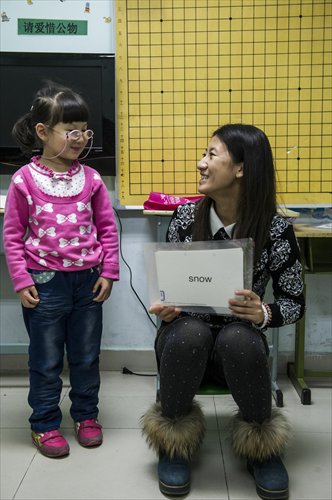

Despite a recent reform lessening the value of English in the national college entrance examinations, private schools aren't bracing for a downturn in business. Photo: Li Hao/GT
Christmas Eve is usually a busy time for last-minute gift shopping, but stores in a mall near Beijing's West Third Ring Road in Maliandao had relatively few customers on Tuesday night. By contrast, nearby English training center Nice World Education was teeming with excited children and adults.
Young teachers dressed as Santa Claus taught Christmas vocabulary to students as several mothers waited in another classroom watching a promotional video for the center's Harvard English program.
A mother in her late 30s turned to a woman next to her to ask, "Does this mean our children will one day be smart enough to attend Harvard University?" Despite asking in jest, her question revealed the shared ambition of many Chinese parents who view English as a gateway to their children's future academic success.
Recent proposals and reforms have reignited debate about the value of English-language education in Chinese schools. In November, the Beijing Municipal Commission of Education announced that English classes would be scrapped from the curriculum for grades one and two from 2014.
In October, the Ministry of Education released a draft set of reforms for the gaokao (national college entrance exams) that included axing English as a test subject. Students can instead take English tests organized by private schools more than once a year, with only the highest score to be cited as a reference for college admissions.
China has been gripped by "English fever" over the past decade, resulting in booming business for the more than 50,000 private English training centers nationwide worth a reported 30 billion yuan ($494.13 million). Centers run by commercial educational giants including New Oriental, Disney English and Wall Street English can be found within malls, residential compounds and on busy streets in Beijing, but the government's push to lessen emphasis on English in schools could limit their appeal and profitability.
Meeting market demand
There are three main target markets for commercial English training centers. The first is prospective overseas university students who hope to pass standardized exams, including the Test of English as a Foreign Language (TOEFL) and the International English Language Testing System (IELTS). The second is adults and professionals who primarily want to learn business English for career purposes. The third and most profitable target market is children, some of whom are as young as 2 or 3.
Cai Lin from CI Consulting, which recently conducted a study on predicted trends over the next five years for China's English training industry, said it's unlikely the government's reforms will deal a blow to the private education sector.
"Instead, it will provide opportunities for English training centers to shift their emphasis from preparing students for exams to cultivating their real ability," she explained.
"English training for high school and university students who want to study overseas won't be affected because in future there will be more Chinese students heading abroad for higher education. There is rigid demand from parents for children to have strong English proficiency to make them more competitive."
Xu Zhihua, general manager of the Harvard English program at Nice World Education in Maliandao, said enrollments haven't declined in the months since the government signaled moves to reform English-language education.
"We haven't seen demand to learn English lessen or any other changes since the reforms were announced," said Xu, 37.
"Because Beijing primary schools are set to cancel English for grades one and two, it is possible that parents will step up their children's English studies at private training centers."
Wang Ming, another manager of the Harvard English program, joined Nice World Education in 2008 when its first training center opened after leaving New Oriental.
"When I worked in the marketing department of New Oriental, I saw rapid expansion of children enrolling and realized this was a booming industry," said Wang, 28, "The number of students at the Maliandao center has risen rapidly since 2008, when we were the only English training center in the area. Now, we have at least eight nearby competitors."
Nice World Education now operates five centers in Haidian, Xicheng and Fengtai districts and Langfang, Hebei Province. Its Maliandao center has more than 500 enrolled students and over 20 English teachers from China and abroad.
Cutting English classes to boost cram schools
2013-11-22Mixed reactions over cutting English classes
2013-11-21Copyright ©1999-2018
Chinanews.com. All rights reserved.
Reproduction in whole or in part without permission is prohibited.